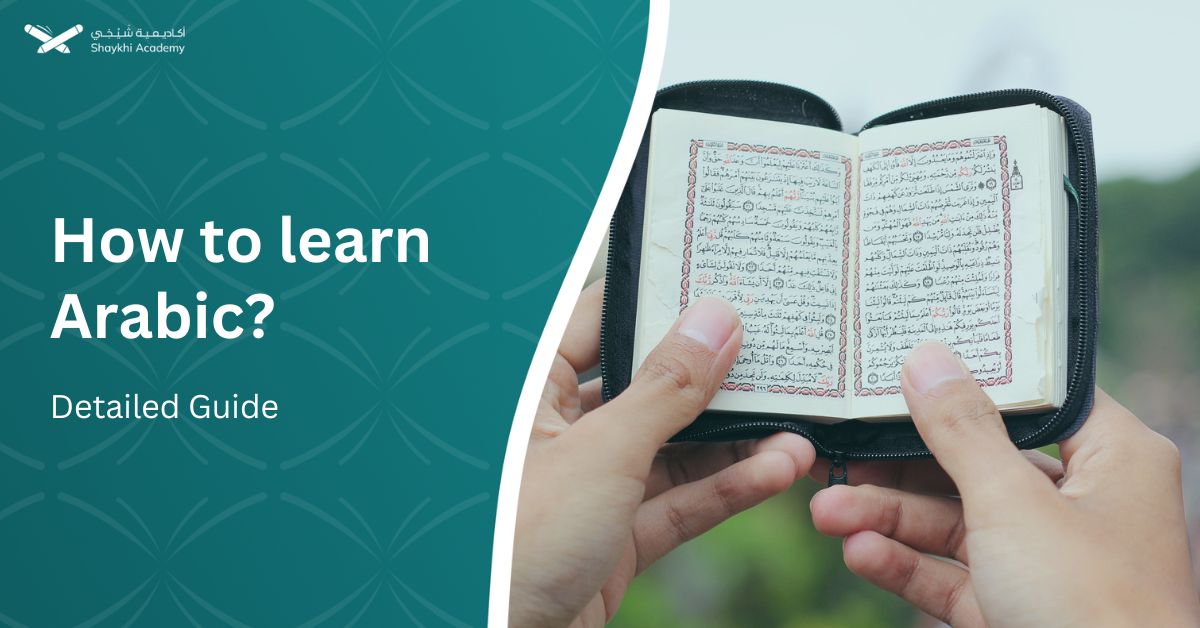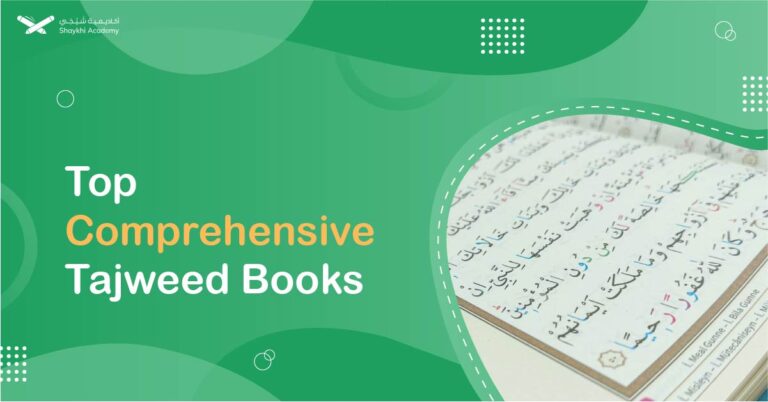To learn Arabic effectively, it’s crucial to follow a structured approach and practice consistently. Start by mastering the Arabic alphabet and pronunciation basics, then focus on expanding your vocabulary with relevant words and phrases. Actively engage in speaking, listening, reading, and writing Arabic regularly to improve fluency and comprehension.

Utilize resources like podcasts, books, and online courses to enhance your skills, and seek guidance from qualified instructors or tutors for personalized feedback and support. Stay motivated by setting goals, immersing yourself in Arabic culture, and celebrating progress along the way. Additionally, consider enrolling your child in online Arabic classes at Shaykhi Academy to foster their love for the language and accelerate their learning journey.
In this blog post, we will delve into the essential aspects of learning the Arabic language to teach you How to learn Arabic? and offer valuable tips for effective language acquisition. Learning Arabic can be a fulfilling experience, exposing individuals to new opportunities and perspectives.
However, achieving mastery of Arabic demands dedication and the application of effective learning strategies. Whether you are a beginner or seeking to improve your existing skills, continue reading for valuable insights that will steer you toward fluency in the captivating language of Arabic.
How to Learn Arabic Effectively?
To effectively learn Arabic, one must follow a well-structured approach and practice consistently. Here are some tips to aid in effective Arabic learning:
1. Begin with the Basics of Arabic
Start by learning the Arabic alphabet and basic rules of pronunciation. This foundation is essential for comprehending and correctly pronouncing words. Make a habit of regularly practicing writing and sounding out letters and words.
2. Focus on Acquiring Arabic Vocabulary
Learn common words and phrases relevant to your daily life and interests. Start with simple words, and gradually increase the complexity of your vocabulary. Use flashcards or apps to review and reinforce your knowledge regularly.
3. Practice Speaking Arabic
Look for opportunities to practice speaking Arabic, such as language exchange programs, conversation partners, or joining online or in-person Arabic-speaking communities. Regularly speaking will help you build confidence and improve your fluency.
5. Listen to Arabic Actively
Listen to native speakers through podcasts, online videos, or audio recordings. Pay attention to their pronunciation, intonation, and rhythm. Try to imitate their speech patterns and accents to improve your speaking skills.
6. Read Arabic Regularly
Begin by reading simple texts, such as children’s books or news articles, and gradually move on to more complex materials. Utilize dictionaries and translation tools to comprehend unfamiliar words and phrases. Reading will enhance your vocabulary and enhance your comprehension abilities.
7. Write Arabic Regularly
Practice writing in Arabic by keeping a journal, writing short stories, or engaging in online discussions. Regular writing exercises will help you reinforce your grammar and vocabulary knowledge, as well as improve your overall writing skills.
8. Seek guidance from an Arabic teacher or tutor
Consider enrolling in online Arabic classes or hiring a private tutor to receive structured instruction and personalized feedback on your progress. A qualified instructor can provide valuable guidance, correct your mistakes, and help you overcome challenges.
9. Choose the Right Arabic Resources
Choose high-quality resources for the Arabic language, such as textbooks, grammar guides, and online courses or apps. Seek out materials that offer concise explanations, practice exercises, and audio recordings to enhance your pronunciation and listening abilities.
10. Stay consistent and motivated
Learning a language requires consistent effort over time. Set aside regular study sessions and practice daily, even if it’s just for a few minutes. Stay motivated by immersing yourself in Arabic culture, watching movies or listening to Audio in Arabic, and celebrating small achievements along the way.
Enroll your child in online Arabic classes for kids at Shaykhi Academy and watch them develop a love for the language. Our experienced teachers make learning fun and interactive, allowing your child to excel in their Arabic skills.
The Different Aspects of Arabic Language Learning
When learning Arabic, there are several aspects to consider to effectively grasp the language. Now, let’s delve into the various aspects of learning the Arabic language in more detail.
1. Pronunciation in Arabic
Learning Arabic pronunciation is crucial as the language has unique phonetic sounds that may be unfamiliar to non-native speakers. Mastery of letter and word pronunciation is fundamental for accurate communication.
2. The Arabic Alphabet
The Arabic alphabet, consisting of 28 letters including consonants and vowels, is the foundation for reading and writing in Arabic. Familiarizing oneself with the Arabic alphabet is essential for language proficiency.
3. Arabic Vowels System
Arabic possesses a distinct vowel system comprising short vowels (fatha, kasra, and damma) and long vowels (alif, waw, and ya). Understanding and distinguishing between these vowel sounds are indispensable for achieving accurate pronunciation.
4. Grammar of Arabic
Arabic grammar can be intricate, encompassing rules for verb conjugation, noun declension, and sentence structure. Gaining knowledge of these grammatical rules and patterns is imperative for constructing meaningful and grammatically correct sentences.
5. Vocabulary in Arabic
A robust vocabulary is fundamental for effective communication in Arabic. Acquiring common words, phrases, and idiomatic expressions empowers learners to express themselves fluently and comprehend Arabic texts and conversations.
6. Arabic Reading Comprehension
Arabic is read from right to left, necessitating learners to adapt to a distinct reading direction. Enhancing reading skills involves comprehending written Arabic scripts and understanding the meanings conveyed in texts.
7. Arabic Writing Skills
Arabic script is cursive, with letters connected within words. Developing proficient writing skills in Arabic entails practicing handwriting and mastering the precise formation of letters and words.
8. Arabic Listening Comprehension
Strengthening listening skills in Arabic entails exposure to spoken Arabic through conversations, audio recordings, and media resources. Proficiency in understanding different accents and dialects contributes to overall language proficiency.
9. Arabic Speaking Practice
Regular engagement in speaking practice plays a pivotal role in improving Arabic speaking skills. Actively participating in conversations, role-plays, and language exchanges facilitates learners’ development into more confident and fluent speakers.
10. Arabic Dialects
Arabic dialects vary across regions, and exposure to different dialects helps learners adapt to various conversational styles. Understanding the differences between dialects and their impact on communication is important for practical usage.
11. Arabic Cultural Awareness
Arabic is deeply rooted in Arab culture, and understanding cultural nuances and etiquette is integral to fully grasping the language. Learning about Arab traditions, customs, and social norms enhances cultural competence.
12. Arabic Language Immersion
Immersing oneself in an Arabic-speaking environment, either through travel or interacting with native speakers, accelerates language acquisition. Constant exposure to spoken Arabic enhances listening comprehension and speaking skills.
Learn Fusha Arabic from the comfort of your home with Shaykhi Academy’s online classes. Master the Arabic language in no time with our immersive and interactive online courses taught by native speakers.
Tips for Choosing the Best Way for Learning Arabic Language
When deciding on the most effective method of learning Arabic, there are several factors to consider. Here are some suggestions to assist you in making an informed decision:
1. Establish Clear Goals
Before selecting a learning approach, identify your objectives for learning Arabic. Are you aiming to achieve fluency or simply learn the fundamentals?
Do you require emphasis on reading and writing or conversational abilities? Knowing your goals will assist you in selecting a method that suits your specific requirements.
2. Consider Your Learning Style
Everyone has a unique learning style. Some individuals prefer visual learning, while others find auditory or kinesthetic methods more effective.
Take some time to reflect on your preferred learning style and choose a method that caters to it. For example, if you are a visual learner, using flashcards or visual aids may be beneficial for you.
3. Evaluate Your Schedule and Availability
Consider your schedule and how much time you can dedicate to learning Arabic. If you have a busy schedule, online methods that offer flexibility might be more suitable for you.
On the other hand, if you prefer a structured approach, attending classes in an Arabic learning academy or hiring a tutor could be a better option.
4. Seek Authentic Language Practice
Immersion is key when learning a new language, so try to incorporate authentic language practice into your learning routine.
This could include finding language exchange partners and joining Arabic-speaking communities. Authentic practice will expose you to real-life situations and enhance your language skills.
5. Use a Combination of Methods
There is no one-size-fits-all approach to learning Arabic. To maximize your progress, consider using a combination of methods that work well for you.
For instance, you could enroll in an online Arabic course for structured learning, complemented by practicing with native speakers or watching Arabic movies with subtitles.
The Best Ways to Speak Arabic Language
Learning to speak Arabic can be a challenging yet rewarding journey. As you progress in your language learning, you may find yourself wondering about the most effective ways to become fluent in spoken Arabic. To help you on this path, here are some tips and strategies for mastering the art of speaking Arabic:
1. Immerse Yourself in Arabic:
Surround yourself with native speakers or immerse yourself in an Arabic-speaking environment as much as possible. This will expose you to natural conversations and accelerate your language acquisition.
2. Practice Regularly:
Consistency is key! Make it a habit to practice speaking Arabic every day, even if it’s just for a few minutes. The more you engage with the language, the faster you’ll progress.
3. Find a Language Partner:
Find a language exchange partner or join conversation groups where you can interact with native speakers who are also learning your native language. This way, both parties will benefit from practicing each other’s languages.
4. Utilize Online Resources:
Take advantage of online platforms that offer interactive lessons, virtual classrooms, and opportunities for live conversation practice with tutors or other learners.
5. Watch Arabic Movies and TV Shows:
Enhance your listening skills by watching movies or TV shows in Arabic with subtitles initially and gradually transitioning into watching without them.
6. Engage in Role-Playing Activities:
Simulate real-life situations by role-playing conversations in different scenarios such as ordering food at a restaurant or asking for directions while practicing vocabulary and sentence construction simultaneously.
7. Don’t Be Afraid to Make Mistakes:
Understand that making mistakes is a natural part of learning, offering chances to improve and develop. Rather than feeling discouraged, view them as valuable learning experiences.
8. Apply What You Learn:
Look for practical ways to use the Arabic language in your daily life. Whether it’s through ordering food at an Arab restaurant or having a conversation with a native speaker, applying what you learn will help solidify your understanding of the language.
9. Be Patient and Persistent:
Learning any language takes time, effort, and patience. Be persistent in your studies, and don’t be discouraged by setbacks. With dedication and practice, you’ll eventually become fluent in speaking Arabic.
Read an indepth discussion on How Long Does It Take To Learn Arabic?
Is Arabic a hard language to learn?
Arabic can be challenging for non-native speakers due to its unique alphabet, complex grammar rules, and different pronunciation compared to other languages. However, with dedication and consistent practice, anyone can learn Arabic successfully.
Are there online options for Arabic language courses and classes?
Enrolling in structured Arabic language courses or classes is the most efficient method for learning Arabic. These courses offer a methodical approach to learning Arabic, beginning with the fundamentals and gradually advancing to more complex levels.
Seek out reputable language schools or online platforms like Shaykhi Academy that provide Arabic courses taught by experienced instructors. Immersion programs or intensive courses can also be advantageous as they offer an immersive setting where you can extensively practice speaking and listening skills.
How can I learn Arabic by myself?
Self-study is possible when learning Arabic as well. Start by familiarizing yourself with the alphabet and basic vocabulary using textbooks, mobile apps, or online resources specifically designed for independent learners. Practice regularly by listening to audio materials, watching videos in Arabic, and engaging in conversations with native speakers if possible.
Can you learn Arabic fast?
The speed at which one learns depends on various factors, such as prior experience with foreign languages, the amount of time dedicated to studying on a daily or weekly basis, and the intensity of immersion activities. It is important to note that achieving fluency takes time and effort. It is recommended to set realistic expectations while maintaining a consistent study routine.
How can I memorize Arabic letters fast?
Memorizing Arabic letters can be challenging, but several techniques can help. Start by learning the basic shapes and sounds of each letter. Practice writing them repeatedly to reinforce your memory. Use mnemonic devices, such as associating each letter with a word or image that resembles its shape. Flashcards or memory games can also help memorize the letters. Regular practice and repetition are key to solidifying your knowledge of Arabic letters.
How to learn Arabic words?
Learning Arabic words can be sped up by implementing a few strategies. Begin with simple words that are comparable to ones you already know in your first language or other languages you are acquainted with. Record unfamiliar words and their definitions, and make flashcards or a list of vocabulary.
Exercise using these words in sentences to enhance your comprehension and memory. Take advantage of online tools, such as Arabic vocabulary lists and quizzes, to supplement your learning. Consistent exposure to Arabic through reading, listening, and speaking will also assist in broadening your vocabulary.
The Al-Menhaj Book is a Recommended Online Resource for Learning Arabic
The Al-Menhaj Book is a highly recommended online resource for individuals who want to learn Arabic. It is specifically designed to cater to the needs of non-native Arabic speakers who are interested in learning the language.
The Al-Menhaj Book provides comprehensive instruction and guidance in Arabic reading, covering the basics such as the Arabic alphabet letters. It is particularly useful for those who also wish to learn how to read the Quran.
The curriculum and materials in the book are carefully developed by experienced teachers with extensive knowledge in teaching Quran and Arabic. Produced by Shaykhi Academy and authored by Luqman ElKasabany, this resource is an excellent choice for anyone looking to embark on their Arabic learning journey.
Start Your Arabic Learning Journey Today with Shaykhi Academy’s Online Arabic Course
Shaykhi Academy offers a comprehensive Learn Arabic Online Course for individuals interested in mastering the Arabic language. Whether you are a beginner or aiming for fluency, this course provides a roadmap to linguistic excellence.
With experienced instructors, engaging activities, and a focus on real-life conversations, Shaykhi Academy ensures that learners not only acquire knowledge of dialects and slang in Arabic but also gain a deep understanding of the language.
Whether you are looking to communicate effectively or enhance your Quranic reading skills, the Learn Arabic Online Course at Shaykhi Academy is a valuable resource for your language learning journey.
Conclusion
Learning Arabic is a challenging yet rewarding journey. To make progress, focus on different aspects of language learning and use effective strategies.
Consistency and practice are key, whether through online resources, courses, or self-study. Immerse yourself by listening to native speakers and engaging with authentic materials.
Check out the Al-Menhaj Book as a recommended online resource. With dedication, you can become proficient in Arabic and open up opportunities for cultural exchange and communication.




















